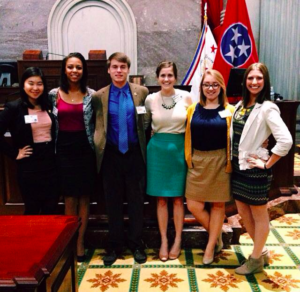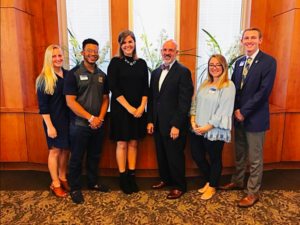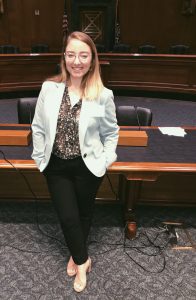Peace, Policy, and Power to the People
Walking into the Center for Arms Control and Non-Proliferation, I really had no idea what to expect. Outside of a thesis on the rhetoric used to discuss the Iran Deal, I had never really studied nuclear weapons or non-proliferation, at least not in depth. I understood the basics of deterrence theory and was aware of the complex nature of the post-Cold War relationship between the United States, Russia, and other former Soviet Union states, but beyond that I didn’t know much. I chose to work at the Center because I wanted to get experience at the nexus of research, advocacy, and Capitol Hill, and also because the opportunity to learn more about U.S. nuclear weapons policy through a gender lens excited me.

Rachel at the 2014 Tennessee Intercollegiate State Legislature event in Nashville, Tennessee with part of the delegation from UTC.
I really became interested in policy and its impact on individual lives at the beginning of college. I was approached by an upperclassman who I met through student government about an organization called the Tennessee Intercollegiate State Legislature, or TISL (pronounced like “tinsel” but without the ‘n’) for short. TISL, I learned, was a statewide organization of college students from all over Tennessee that came together once a year and pretended to be the state government for a weekend.
I promise you read that correctly. The organization—which included the executive, legislative and judicial branches, as well as lobbyists, media representatives and an election commission—took over the official congressional chambers on capitol hill in Nashville, Tennessee for one weekend every fall to write and debate legislation in committees and on the floor. It wasn’t completely frivolous, though. The goal was to learn about the legislative process and to gain experiencing writing, researching, and debating policy, but there was a “real-life” component, as well. Bills that managed to make it off of the jam packed legislative calendar, out of committee, and through both chambers, would end up on the TISL Governor’s desk. Along with the rest of the Executive Council, the Governor approved a certain number of these bills to go to the desk of Tennessee’s Secretary of State, with the opportunity to get fast tracked to key Tennessee state legislators who could bring the bill to life.

Rachel and the UTC Student Government delegation to a 2017 summit of UT System student government leaders at a meeting with UT System President Joe DiPietro to discuss statewide legislative issues regarding the UT system.
In TISL, students were encouraged to write legislation that spoke to the concerns that we had as Tennesseans. We were given the opportunity to debate road rules and traffic laws, urban and agricultural strategies, healthcare and education, regulations placed on universities, and policies that hindered free speech and equal rights. My experience with TISL is what sparked my passion for policy and the legislative process, which absolutely includes advocacy. Throughout college, I knew that I wanted to develop a career related to policy and legislation in some way—and to be honest, I’m still working out exactly what that’s going to look like for me.
At the beginning of my fellowship at the Center, I started a blog series titled “Women in Nuclear History.” I’ve written about some pretty incredible women, including Bella Abzug, who was actually the first woman I featured in the series. Bella was a passionate organizer who advocated strongly for women’s equality and strongly against nuclear proliferation. Bella’s efforts helped mobilize over 50,000 women to march in protest to above-ground nuclear testing, and ultimately contributed to the ratification of the 1963 Limited Test Ban Treaty.

Rachel at the Center for Arms Control and Non-Proliferation’s summer event in 2019 on Capitol Hill, attended by Senator Chris Murphy, Representative Adam Smith and Speaker Nancy Pelosi.
Bella’s story of the impact that advocacy can have on legislation is inspiring, but what’s even more inspiring is that it didn’t end with her.
There are hundreds of people working on nuclear policy in this community right now who are passionate about making the world a safer, more stable place for us to live, and they make a major impact by directly advocating for legislation and foreign policies that align with that goal. Throughout the last seven months, I’ve attended educational events geared towards both congressional staffers and members of Congress. I’ve witnessed the success of the persistence of advocacy groups that can be seen through key votes by unpredictable politicians. I’ve learned even more about the importance of electing Senators, Representatives and Presidents who understand and verbally exalt the importance of multilateral, working level diplomacy.
I wholeheartedly believe that when people come together to influence policy, we have the power to make change in the name of peace. My time at the Center has only cemented this belief, and I am beyond grateful.
Rachel Emond was a Spring 2019 Scoville Fellow at the Center for Arms Control and Non-Proliferation.
